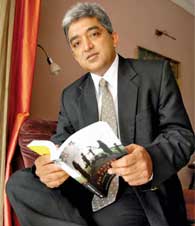more. Then came the formalized
credit offer of themall, the credit card.
The plastic economy helped boom
consumer retail buys. And then this
credit card went from credit for
groceries to credit for cars to credit for
homes(mortgages) to credit to banks
to credit to loan-swaps amidst banks,
et al!The solid economy based on what
people had morphed into a hollow
economy based on what people did
not have but pretended to have—the
economy had to collapse. Subprime,
derivatives and all came crashing
down the economy.
This is where India is different. We
still do not believe in credit as much
as theWesterner does or did.We are a
cash economy. We are largely led by
what we have than by what we aspire
to have. Our Eastern philosophy has
helped us greatly. Let’s stay this way.
Let’s take the US crisis as a warning
bell waking us all up.
Banks are going to hate me. A good
start would be to stop using your
credit card. A good way would be to
manage with what one has rather
than what one does not have but
wants to have. A good way would be
to pay up your credit card dues every
month as soon as the bill arrives,
without availing the EMI services. A
good way to ward all this off would
be to postpone a buy rather than prepone
a buy!
What lessons should countries,
companies and individuals draw
from this unprecedented crisis? Is it
correct to say that this is a Great
Depression II?
Not yet. Hope 1929 never happens
again! I do believe several of our
markets are just in an economic
slowdown. We are. We wanted to
grow at 9.5% but we will grow at
4.8%. This is a slowdown. Some of
the world markets are in a recession.
The US market is. Depression is the
final stage of scraping the bottom of it
all. I just hope no market touches
this. This is an era of job-queues,
food-shortages, fights, et al!
How do you think the US Financial
Crisis would have affected Indian
companies and Indian consumer
psyche? What should marketers in
such circumstances do to get the
consumers keep spending on their
products/services/brands?
The crisis has been a wake-up call to
the Indian consumer. The Indian
consumer still has money in his
hands, but this crisis has jolted
everyone. Today, even if you have
money in the bank, you want it kept
right there. Cash is king. We live in a
slightly more insecure economy today. Cash is there, but people will
postpone purchases. Upgrades will
not happen as soon as they used to
happen. In purchases, downgrading
will happen. Instead of that swank
sedan, onemight settle for a 2-box car.
Festival splurges will be less as well.
The celebration economy will be
more cautious as well. People will
splurge less and save more.
In more ways than one, a
postponement of purchase is a
recession. I do believe India is into a
cautionary recession. We have the
money but will not spend it.
Insecurity is the mood around. The
real insulatedmarket of themall is the
rural market. Seventy two per cent of
our people live here. This economy is
still spending the way it was.
Nearly 55,000 employees, who are
on Satyam’s payroll, are crestfallen
with Satyam’s colossal collapse
amidst US financial crisis. Satyam
Learning Centre (headed by Ed
Cohen from Booz, Allen & Hamilton)
has been busy last few weeks trying
to calm them down and rally all of
themaround a criticalmission to turn
things around. What would be your
advice to Ed Cohen and his team to
make a meaningful impact on the
employees’ morale and commitment?
Ed and team must actually get going
with a solid Internal Branding
program. A comprehensive program
that covers every employee (maybe
40,000 of them after de-fudging the
list of employees), their immediate
families, their extended families, their
vendors, clients and indeed every
other stakeholder.
